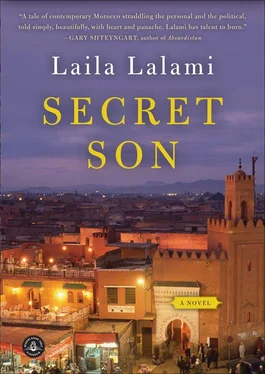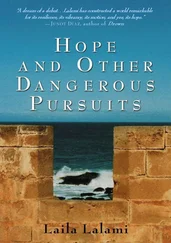Some of his friends — journalists, professors, writers, artists — were forced into exile, in Cairo or Paris or Madrid. He knew people who had been imprisoned and tortured. One of his colleagues was made to disappear. Bit by bit, he began to lose hope, betray his ideals, trade his love of country for the comfort of home. By the time he was twenty-nine, he had given up. He told himself he was married, with a child on the way, that his wife — fragile as she was — would not be able to take care of Amal if something were to happen to him. He could no longer take the risk of wanting change. He started working for his father in the family business, like his father before him, and had been content to think of politics as something that was discussed every once in a while over a glass of whiskey or during a game of golf. Whatever happened in the nation or the world was not his concern any longer.
Now Nabil sat in his office in AmraCo, staring out the window at the city, with the minaret of the King Hassan Mosque at one end, the Twin Center towers at the other, and the vast, the incredible sea of homes and apartment buildings in between. What had he done with his life? The pain in his chest made it difficult to breathe, and in order to distract himself, he turned his office television on, watched a young journalist chatter on about the imminent danger of Islamic fundamentalism. He turned the TV off, tossing the remote on the desk. Young people these days seemed to have no idea what country they were from; they talked of Morocco as if its history had begun ten years ago, as if the issues they were facing had just appeared on the scene, lacking any provenance, devoid of any context.
He was overcome now by a feeling of shame at having turned away Farid Benaboud when he had asked for support. He had heard from a friend that Benaboud was in trouble — and not just the usual harassment, like slashed tires, or tapped phones, or stolen mail, but something else altogether, something far more sinister. How long before Benaboud gave up and he, too, made politics the occasional subject of a game of golf? He would close down the magazine; or worse, he would keep it open and turn it into a sounding board, against which the praises of the most beautiful country in the world could be sung and amplified.
There was something in Benaboud that Nabil recognized — a part of his old self, a part of the past he had long betrayed. And it was in order to save that sliver of himself, in order to be loyal to that past, that he picked up the phone and called to say he would write a statement of support. He knew this would anger his friends in government. But it would make others like him pause, and perhaps they could help Benaboud’s magazine survive. This time, at least.

Youssef was lying on his bed when he heard his mother crying. Immediately alarmed, he ran to the yard. “Yak labas?” he asked. She pointed to the television screen; she was watching The Nightingale’s Prayer . “You startled me,” he said, his hand on his heart.
“It’s nothing,” she said. She wiped her tears and shook her head, embarrassed to have been crying over a movie.
“It’s all right,” he said softly. He sat down next to her, watching for a few minutes. Nightingale was not his favorite film by Henry Barakat — he preferred his earlier work. But the performances by Faten Hamama and Zahrat El ‘Ola made it worth watching.
“Tell me,” she said, clearly wanting to change the subject, “were you going out?”
“Oh, no. No, I wasn’t.”
“You’ve been staying home a lot.”
He couldn’t tell her why. Even if he could tell her, he would have been ashamed to.
Why had he agreed to Hatim’s plans? Even now, days later, he did not have a simple explanation.
His troubles had started when he had left Hay An Najat. He wished that he had never left the neighborhood, never dropped out of college, never said yes when Moussa came to the door to ask him to meet Hatim, never heard of Hatim’s plans. Hatim had given him the impossible task of choosing between his mother and his father, and in his shock at realizing that his secret was no longer a secret, he had found himself cornered and forced to make a decision. The words had escaped his mouth before he could weigh their meanings or their consequences. Hatim had seemed satisfied because that answer meant Youssef would agree to the operation.
But Hatim did not know what Youssef’s mother was like, or he would not have invoked her. Youssef’s mother hated politicians, people who showed up in Hay An Najat only in election years. She made no distinction between the Party and the others, saying they all cared about the same things. If she had been in Youssef’s shoes, she would already have reported Hatim to the police. How could he betray her now by doing the very thing she would never agree to?
Then there was Hatim’s insistence that the mission was part of a bigger plan, where each person had a role. Youssef was tired of playing a role; he wanted, for once — for just this once — to be himself: Youssef El Mekki, son to a loving mother, college dropout, movie fanatic, perpetual loser at chess. But there was no going back. He had made a choice, and if he recanted it now, Hatim would kill him — or his mother.
He was a coward. He was letting an innocent man be killed for fear that his own innocent mother would be murdered. Night after night, he lay on his bed, stared at the ceiling, willed his mind to be blank. It was the only way he had found to convince himself that nothing he could do would change the course of things, that nothing was under his control. The plot would be carried out with or without his involvement.
When on Saturday the new issue of Casablanca Magazine came out, Youssef was stunned to read Nabil Amrani’s article. He had come forward to support Farid Benaboud, to say that the intimidations had to stop. The old man has finally grown a backbone, Youssef thought, and despite himself he felt pride. Nabil Amrani’s support would surely help Benaboud, but how could it save him from Hatim? On his way back home from the newsstand, Youssef once again had the feeling of being watched, and he hurried home, where he would be safe, and silent.

Rachida had not meant to eavesdrop. In fact, she would not have paid any attention to Maati and the older man with whom he was talking if they had not switched from speaking Darija to Tamazight when they noticed her walking behind them. She was in a rush to get home to catch her Mexican soap opera, and the lane was narrow, so she had come up behind them at a quick pace, expecting they would step aside to let her pass. But instead they switched to Tamazight. Without knowing why, she slowed down and listened.
Maati’s companion asked him about the Party.
“Two men came to see Hatim yesterday,” Maati replied. “One of them is tall, about one meter eighty. Completely bald. Long beard. First name is Reda. The other one is about my height. Dark hair. Brown eyes. He has a lame leg. I don’t know his name.”
“We’re familiar with Reda, alias El Mdardag. I think I know who the other man is, but find out his name.”
They arrived at a fork in the road, and Rachida had to turn and head toward her house. She did not dare look back, though she kept listening to the sound of Maati’s flip-flops until it faded away, down the other road. Maati! The high school dropout, the failed boxer, the good-for-nothing whose smile made her wonder whether any thought had ever entered his head. She would never have guessed he was a police informant. Appearances were deceiving — and how.
Читать дальше













